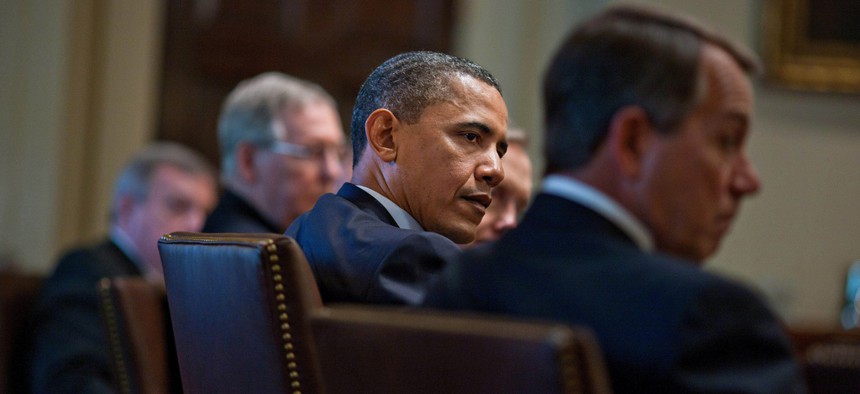
Obama meets with Congressional leaders regularly. White House file photo
Obama, Hill Leaders Far Apart at White House Meeting
Only real progress comes on Syria, with Obama pledging to work on a use of force resolution.
Two weeks into a year already marked by a spate of veto threats, President Obama and congressional leaders met Tuesday with pledges to work together—and plenty of time spent parsing who's obstructing whom.
Following a morning huddle at the White House attended by nearly 20 members of Congress, both Republicans and the Democrats identified areas of common ground where they expect to see progress in 2014, including trade, taxes, and cybersecurity. And Obama went further than he has in the past by pledging to work with legislators to draft a bill to combat the Islamic State.
Many in Congress—Democrats included—have urged the White House to put forward an Authorization for Use of Military Force in Syria. While the administration had previously urged Congress to take the lead on that measure, Obama shifted gears on Tuesday.
House Minority Leader Nancy Pelosi said after the meeting that Obama "has given us a long time to come up with something ourselves. Since we haven't, he now says he will send something. I don't know if that's a shift or recognizing the fact that Congress hasn't done anything."
Speaker John Boehner said in a release that historically, the president "has identified the need for use of military force, written the AUMF, sent it to Capitol Hill, and worked to build a bipartisan coalition to secure its passage." If Obama does that, Boehner said, "Republicans will work with him to build bipartisan support for its enactment."
But on areas of staunch disagreement, the meeting did little to suggest a thaw in the compromise-averse politics that have defined much of Obama's tenure.
Boehner, according to his office, opened his remarks by urging the president to reconsider his veto threat on a bill to force through the Keystone XL pipeline. He followed that by doubling down on the GOP's strategy of using funding for the Department of Homeland Security as a mechanism to block the administration's immigration plan.
Unsurprisingly, his appeals did little to reverse White House positions. Later in the day, press secretary Josh Earnest shot back at the notion that Obama is obstructing Congress, blaming Republicans for "recycling old legislation" that they already know will meet the president's veto pen.
Policy differences aside, Republicans complained that the timing of Obama's veto threats sends the wrong message.
"There were some suggestions made that it would be helpful if the president didn't threaten vetoes so early on in the process, that he allow the process to move forward," Sen. John Thune said following the meeting. "But unfortunately he's pretty dug-in on some of those issues. I think in terms of the relationship, working with Congress is advantageous to him in the long run and to us. For him not to draw lines in the sand so early on—I mean, give the process a chance to play out, the legislative branch of the government a chance to be heard from."
Whether or not the timing of veto threats is really what's holding Congress back, each party was quick to disparage the other's early-term priorities. "We have a big difference as to why this Congress will not honor our responsibility to the oath we take to protect and defend—and mess with the Homeland Security bill," Pelosi said after the meeting. She was equally dismissive when asked about Boehner's emphasis on Keystone XL during the meeting. "It was not the center of our attention," she said.
Boehner, for his part, said Republicans had in the past crafted cybersecurity legislation—a recent priority of Obama's—only to see it die in the Democratic-controlled Senate.
Still, all the leaders sprinkled their takeaways from the meeting with hopeful thoughts to the effect that Washington can work together. Obama and Boehner both said expanding trade and reforming the tax code could be areas of bipartisan agreement. And all parties seemed to be in agreement that bolstering the nation's cybersecurity is a priority; Obama pledged bipartisan legislation in the near future.
If the meeting was short on groundbreaking legislative deals, members at least deemed it productive enough to be worth doing again. The attendees agreed, according to Pelosi, on at least one thing—that they should have more meetings.
Sarah Mimms contributed to this article.






